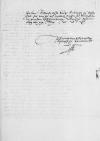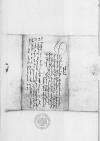E(wer) F(urstlichen) D(urchlauch)t cf. Albrecht I von Hohenzollern-Ansbach to Ioannes DANTISCUS Königsberg, 1540-05-12, CIDTC IDL 4998⌊schreibencf. Albrecht I von Hohenzollern-Ansbach to Ioannes DANTISCUS Königsberg, 1540-05-12, CIDTC IDL 4998⌋, denn XII dis monts / von Königsberg (Królewiec, Mons Regius, Regiomontium), city in Ducal Prussia, on the mouth of the Pregel (Pregoła) river, capital city of Ducal Prussia; today Kaliningrad in Russia⌊KonigsbergKönigsberg (Królewiec, Mons Regius, Regiomontium), city in Ducal Prussia, on the mouth of the Pregel (Pregoła) river, capital city of Ducal Prussia; today Kaliningrad in Russia⌋ / an uns ausgangenn, / habe wir hie erhalten. / Doruff, / dieweil solchs wichtige hendel in sich helt, / wolt nottig sein wolbedacht unnd weitleufftig zuantworten, / das uns dismal, / beladen mit dieser tagleistunge viler sachen und hendelh, / nicht wol muglich. / Mussens auch derhalben bis zu bekuemer zeit lassen anstehen. / Nichts wenigers, was die ausschiffung betrifft, / aus angezeigtten von / E(wer) F(urstlichen) D(urchlauch)t ursachen, / ist uns nicht zu widder, / das die vorbotten bei den Inhabitants of Royal Prussia ⌊unsernInhabitants of Royal Prussia ⌋ bleibe. / Wir achtens aber nicht unnutz, / das ein zeit wurde angesetzt und bestimpt, / wie lange solch vorbott sold gehalten werden, / domit, / wan E(wer) F(urstliche) D(urchlauch)t Citizens of Ducal Prussia ⌊underthanenCitizens of Ducal Prussia ⌋ zuschiffen wurd freÿ gegeben, / das es die Inhabitants of Royal Prussia ⌊unsernInhabitants of Royal Prussia ⌋ auch mochten wissen / und ÿre narung zusuchen nicht vorseumet wurden. / Bitten derwegen, / wie wir auch zuvor cf. Ioannes DANTISCUS to Albrecht I von Hohenzollern-Ansbach Heilsberg (Lidzbark Warmiński), 1540-05-02, CIDTC IDL 5241⌊geschriebenncf. Ioannes DANTISCUS to Albrecht I von Hohenzollern-Ansbach Heilsberg (Lidzbark Warmiński), 1540-05-02, CIDTC IDL 5241⌋, / solche gesatzte zeitt uns mit den ersten kundt wolde thun. / Das E(wer) F(urstliche) D(urchlauch)t an Sigismund I Jagiellon (Zygmunt I) (*1467 – †1548), King of Poland and Grand Duke of Lithuania (1506-1548); Duke of Głogów (Glogau) (1499-1506), Duke of Opava (1501-1506), Governor of Silesia (1504-1506); son of King Kazimierz IV Jagiellon and Elisabeth of Austria⌊konigliche m(aieste)tSigismund I Jagiellon (Zygmunt I) (*1467 – †1548), King of Poland and Grand Duke of Lithuania (1506-1548); Duke of Głogów (Glogau) (1499-1506), Duke of Opava (1501-1506), Governor of Silesia (1504-1506); son of King Kazimierz IV Jagiellon and Elisabeth of Austria⌋, unsern allergnedigisten herren, geschrieben, / domit die acht wurde abgethan, bei Charles V of Habsburg (*1500 – †1558), ruler of the Burgundian territories (1506-1555), King of Spain as Charles I (1516-1556), King of Naples and Sicily, King of the Romans (1519-1530), Holy Roman Emperor of the German Nation (elected 1519, crowned 1530, abdicated 1556); son of Philip I the Handsome and Joanna the Mad of Castile⌊key(serliche)r m(aieste)tCharles V of Habsburg (*1500 – †1558), ruler of the Burgundian territories (1506-1555), King of Spain as Charles I (1516-1556), King of Naples and Sicily, King of the Romans (1519-1530), Holy Roman Emperor of the German Nation (elected 1519, crowned 1530, abdicated 1556); son of Philip I the Handsome and Joanna the Mad of Castile⌋ / durch iren botschaffter / zu furdern, / ist uns fast lieb / und notig. / Wollen auch fortstellen, / so der erbar, ernfest h(er) Johann von Werden (Constellatus, cf. HE, No. 148, p. 150, footnote No. 12) (*1495 – †1554), 1526 Mayor of Gdańsk (Danzig), from 1527 Starost of Neuenburg (Nowe), 1532-1535, 1538, 1539, 1546, 1551 Burgrave of Gdańsk, from 1535 Starost of Preußisch Mark (Przezmark) (1535-1540 together with Achatius von Zehmen (Cema)), 1536/1537 envoy of the Council of Royal Prussia to the Diet of the Kingdom of Poland held in Cracow (SBPN 4, p. 433-435; ZDRENKA 2, p. 368-369; MAŁŁEK 1976, p. 93, 161)⌊Johan von WerdenJohann von Werden (Constellatus, cf. HE, No. 148, p. 150, footnote No. 12) (*1495 – †1554), 1526 Mayor of Gdańsk (Danzig), from 1527 Starost of Neuenburg (Nowe), 1532-1535, 1538, 1539, 1546, 1551 Burgrave of Gdańsk, from 1535 Starost of Preußisch Mark (Przezmark) (1535-1540 together with Achatius von Zehmen (Cema)), 1536/1537 envoy of the Council of Royal Prussia to the Diet of the Kingdom of Poland held in Cracow (SBPN 4, p. 433-435; ZDRENKA 2, p. 368-369; MAŁŁEK 1976, p. 93, 161)⌋, burgermeister zu Gdańsk (Danzig, Dantiscum), city in northern Poland, on the Bay of Gdańsk at the mouth of the Vistula, on the Baltic, the biggest and wealthiest of the three Great Prussian Cities (Gdańsk, Thorn (Toruń), and Elbing (Elbląg)) with representation in the Council of Royal Prussia; a member of the Hanseatic League⌊DantzkeGdańsk (Danzig, Dantiscum), city in northern Poland, on the Bay of Gdańsk at the mouth of the Vistula, on the Baltic, the biggest and wealthiest of the three Great Prussian Cities (Gdańsk, Thorn (Toruń), and Elbing (Elbląg)) with representation in the Council of Royal Prussia; a member of the Hanseatic League⌋ und heubtman zur Neuenburg (Nowe), town in northern Poland, Pomerania, on the Vistula river, 19 km N of Graudenz⌊NeuenburgNeuenburg (Nowe), town in northern Poland, Pomerania, on the Vistula river, 19 km N of Graudenz⌋, / sich des orts, / wie E(wer) F(urstliche) D(urchlauch)t anzeigen, / wurd begeben, / das im Sigismund I Jagiellon (Zygmunt I) (*1467 – †1548), King of Poland and Grand Duke of Lithuania (1506-1548); Duke of Głogów (Glogau) (1499-1506), Duke of Opava (1501-1506), Governor of Silesia (1504-1506); son of King Kazimierz IV Jagiellon and Elisabeth of Austria⌊konigliche m(aieste)tSigismund I Jagiellon (Zygmunt I) (*1467 – †1548), King of Poland and Grand Duke of Lithuania (1506-1548); Duke of Głogów (Glogau) (1499-1506), Duke of Opava (1501-1506), Governor of Silesia (1504-1506); son of King Kazimierz IV Jagiellon and Elisabeth of Austria⌋ auch bevellich mit gebe, / diese sache zu sollicitirn, / und hirinne durch eigenen boten aus dieser Provincial Diet of Royal Prussia ⌊tagefartProvincial Diet of Royal Prussia ⌋ koniglicher m(aieste)t, auch andern unsern freunden, an hoff schreiben, / unnd uns E(wer) F(urstlichen) D(urchlauch)t, der gunst wir uns befelhen, / rath unnd willen nach  GStA PK, HBA, C1 No 678, 2 unnumbered halten. / Bittende disse kurtze antwort zu dieser zeit, / die uns zu vil andern dingen zu kurtz felt, / in gunsten uffzunehmen. /
GStA PK, HBA, C1 No 678, 2 unnumbered halten. / Bittende disse kurtze antwort zu dieser zeit, / die uns zu vil andern dingen zu kurtz felt, / in gunsten uffzunehmen. /
 GStA PK, HBA, C1 No 678, 4 unnumbered
GStA PK, HBA, C1 No 678, 4 unnumbered  GStA PK, HBA, C1 No 678, 1 unnumbered
GStA PK, HBA, C1 No 678, 1 unnumbered  GStA PK, HBA, C1 No 678, 2 unnumbered halten. / Bittende disse kurtze antwort zu dieser zeit, / die uns zu vil andern dingen zu kurtz felt, / in gunsten uffzunehmen. /
GStA PK, HBA, C1 No 678, 2 unnumbered halten. / Bittende disse kurtze antwort zu dieser zeit, / die uns zu vil andern dingen zu kurtz felt, / in gunsten uffzunehmen. /



